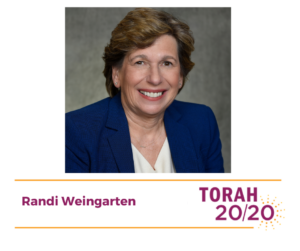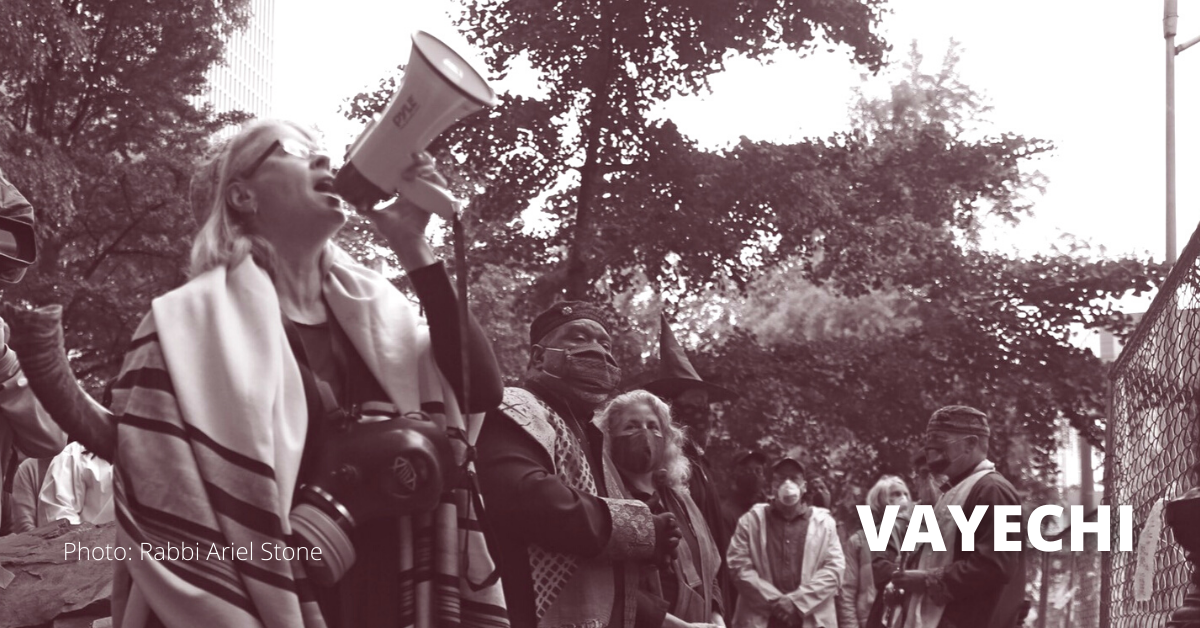A D’var Torah for Parshat Vayechi by Randi Weingarten
The Book of Genesis, the first in the Jewish Bible, begins with the creation of the universe. It can’t get more big picture than that. We are told that the creation of humanity is accomplished so that every person is b’tzelem elohim, in the image of the creator.
The Book of Genesis ends with this parshah, Vayechi, which focuses not on the universe, but on how our ancestors deal with generational change; the death of one generation and the legacy left to those who carry on after them.
We learn first of the death of Jacob, his blessings of his children, and then Genesis ends with the death of Joseph, his child.
Each of them leaves instructions, and a legacy. Yet at the same time as the Book of Genesis ends, the next book of Exodus begins with an existential challenge — the enslavement of the descendants of Jacob and Joseph and their family.
Sign up to receive Torah 20/20 in your inbox each week.
How do we leave a legacy for future generations that will strengthen them no matter the reality of their lives, even if they inhabit a reality that we can’t yet imagine? How do we take the wishes and dreams of our ancestors and live a life that honors their memories?
We live in tumultuous times. And we don’t know what the future will hold.
As a long-time labor leader and educator, I have leaned on the lessons of my mentors. They taught me things that have given me strength, vision, and a resilience that helps me traverse the times we are in — even though they could not have begun to imagine a Donald Trump or a Mitch McConnell.
We fight for justice and opportunity, but these fights require power to make change. And workers only really gain power through collective action. So, be prepared to engage in these fights, and to engage in them with the people you represent and the people that you serve. That requires you to really respect the dreams and aspirations of your community. It is imperative on us to listen, to hear, to do our homework, to be prepared for setbacks, and to celebrate and share the victories. To be and to act as a community.
Find more commentaries on Parshat Vayechi
With our nation divided, under a president whose aim was to stoke hate and division, we have experienced the worst of moments. Yet in these difficult times, we also came to a deeper understanding that human life thrives on connection and on community, that a life well lived is one filled with love and with meaning, that we find our own path to get through the darkness to the light, from Egypt to our own promised land. When our loved ones call to us, we find a way to respond, to make them feel safe, as best we can. We listen to their words, to their instruction, and we commit ourselves to carrying on their legacy, even as we find our own paths to walk.
May each of us find peace for ourselves and for those among us. And may we rise together, like the nascent nation that we witness emerging from the pages of Genesis, to live lives filled with purpose and meaning, not only for us as individuals, but for us as part of a community of nations.
 Randi Weingarten is president of the 1.7 million-member American Federation of Teachers, AFL-CIO, which represents teachers; paraprofessionals and school-related personnel; higher education faculty and staff; nurses and other healthcare professionals; local, state and federal government employees; and early childhood educators. The AFT champions fairness; democracy; economic opportunity; and high-quality public education, healthcare and public services for students, their families and communities. The AFT and its members advance these principles through community engagement, organizing, collective bargaining and political activism, and especially through members’ work. Weingarten was born in 1957 and raised in Rockland County, N.Y., and now resides in New York City.
Randi Weingarten is president of the 1.7 million-member American Federation of Teachers, AFL-CIO, which represents teachers; paraprofessionals and school-related personnel; higher education faculty and staff; nurses and other healthcare professionals; local, state and federal government employees; and early childhood educators. The AFT champions fairness; democracy; economic opportunity; and high-quality public education, healthcare and public services for students, their families and communities. The AFT and its members advance these principles through community engagement, organizing, collective bargaining and political activism, and especially through members’ work. Weingarten was born in 1957 and raised in Rockland County, N.Y., and now resides in New York City.

